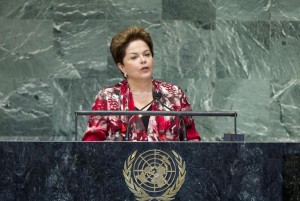Government “corruption” – trumpeted by international media and exploited by U.S.-funded NGOs – is a favorite weapon for discrediting and removing populist leaders, as is now occurring in Brazil, explains Dan Steinbock.
While international media focuses on Brazil’s mass demonstrations against corruption, efforts behind the façade precipitate regime change, restoration of a pre-Lula order, and a struggle against the BRICS nations. The U.S. feels threatened by an era of multi-polarity, which deeply implicates China, and other emerging economies.
In August 2016, Rio de Janeiro should host South America’s first-ever Olympic games, which were supposed to be its great coming out carnival, even amid campaigns against the Zika virus. Only a few years ago, Brazil exemplified the BRIC dream of rapid growth. Now it is coping with its most severe recession in a century. But there’s worse ahead.
Brazil’s President Dilma Rousseff addressing the United Nations General Assembly. (UN Photo by Marco Castro)
When Brazil’s first working-class President Luis Inácio Lula da Silva took office in 2003, the poor nation was on the verge of an economic implosion. President Lula’s center-left Workers’ Party (PT) and its coalition won the markets with conservative fiscal policy and lifted millions from poverty, while living standards rose by 60 percent.
Timing was favorable. A year after China joined the World Trade Organization; Lula initiated Brazil’s economic reforms. To modernize, Brazil needed demand for its commodities; to industrialize, China needed commodities. In the subsequent eight years, the U.S. share of Brazil’s exports plunged, while China’s soared. Regionally, Brazil became Latin America’s growth engine. Brazil and China shunned President George W. Bush’s unipolar foreign policy; each supported a more multipolar view of the world.
…click on the above link to read the rest of the article…








